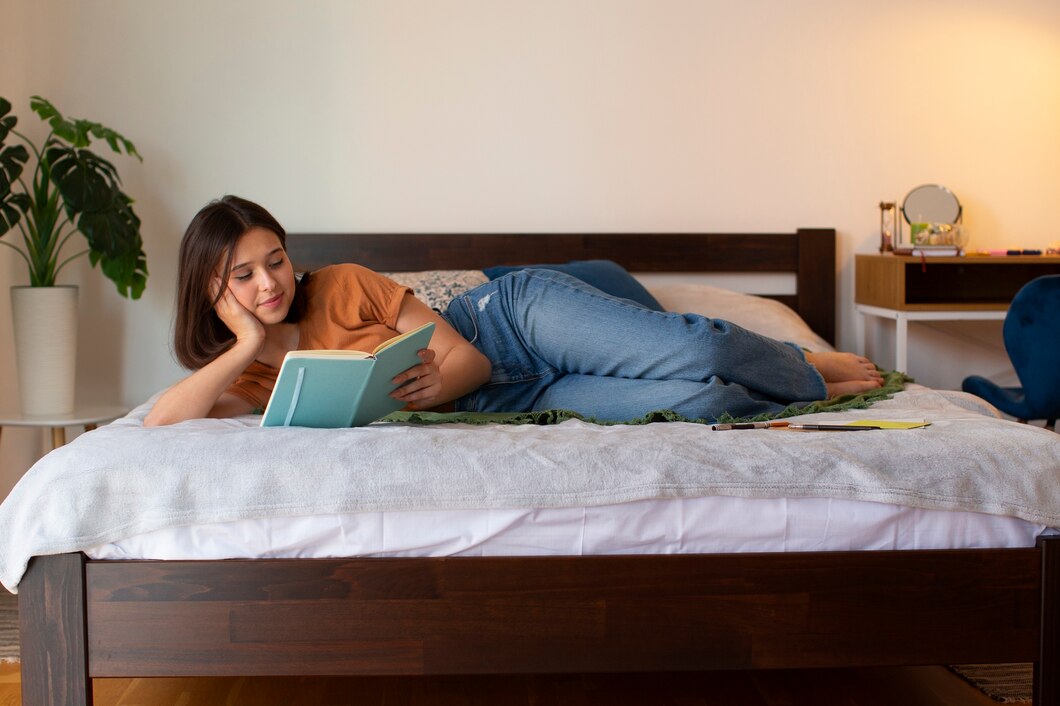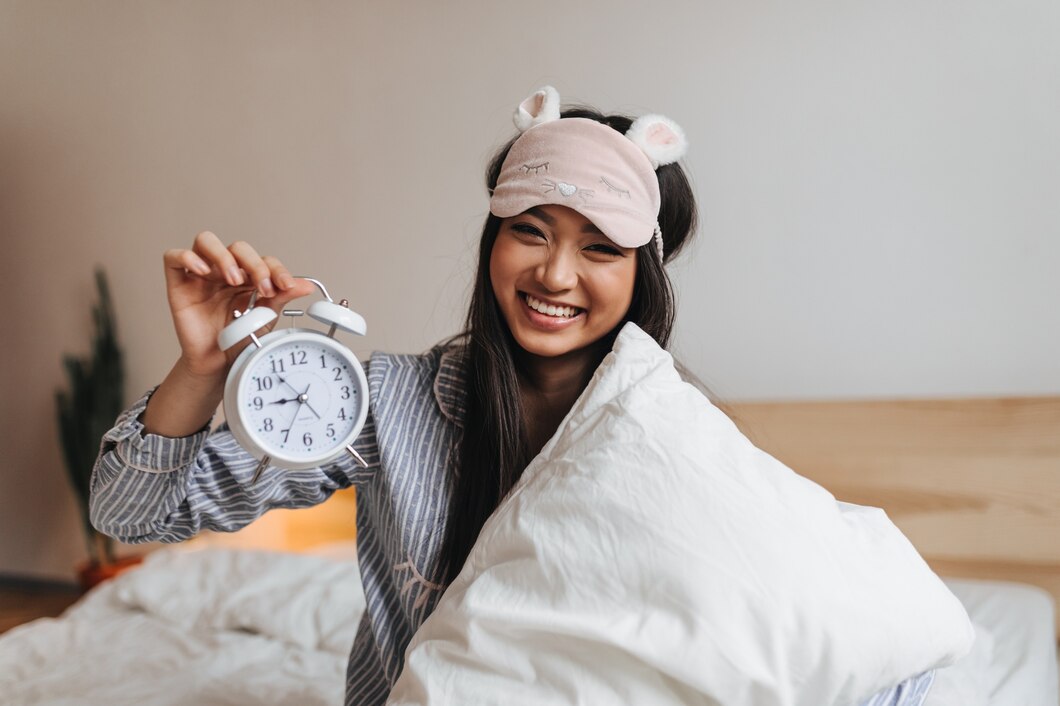
The Best Night-time Routine for Deep, Restorative Sleep
A good nighttime routine is key for deep, restorative sleep. Sleep contributes to general health, affecting energy levels, mood, and mental performance. Stress, poor habits, and screen time make it difficult to fall and stay asleep.
This guide covers the best night routine for sleep. It explains how to use relaxation techniques and bedtime habits. These tips help you unwind and wake up feeling energised.
Why a Nighttime Routine Matters

Following a consistent bedtime routine can:
- Regulate the body’s circadian rhythm for a stable sleep-wake cycle.
- Enhance melatonin production, the hormone responsible for sleep.
- Reduce stress and anxiety, allowing for faster sleep onset.
- Improve overall sleep quality and duration.
- Promote long-term physical and mental well-being.
- Strengthen the immune system and improve memory retention.
Step-by-Step Guide to an Effective Nighttime Routine
1. Set a Consistent Sleep Schedule
Going to bed and waking up at the same time every day, even on weekends, helps regulate your body’s internal clock. Try to aim for 7-9 hours of sleep per night. Following a regular sleep schedule helps maintain healthy circadian rhythms. This makes it easier to fall asleep and wake up feeling refreshed.
2. Limit Blue Light Exposure
Electronic screens give off blue light. This light disrupts melatonin production. It tricks your brain into thinking it’s still daytime. To minimise blue light exposure:
- Avoid screens 1-2 hours before bedtime.
- Use blue light filter settings on devices.
- Wear blue light-blocking glasses if screen use is unavoidable.
- Switch to warm, dim lighting in the evening to support melatonin production.
3. Create a Relaxing Pre-Sleep Ritual
Engage in calming activities that signal your body that it’s time to sleep:
- Reading a book (preferably a physical copy rather than an e-book).
- Taking a warm bath or shower to relax muscles and lower body temperature.
- Practicing meditation or deep breathing exercises to calm the nervous system.
- Writing in a journal to release anxious thoughts and clear the mind.
- Drinking a warm, caffeine-free beverage such as chamomile tea or warm milk.
4. Optimize Your Sleep Environment
A sleep-friendly bedroom can make a huge difference in your rest quality. Ensure your bedroom is:
- Cool: Keep your bedroom between 60-67°F (15-19°C).
- Dark: Use blackout curtains or an eye mask to block unwanted light.
- Quiet: Use earplugs or a white noise machine to mask disruptions.
- Comfortable: Invest in a high-quality mattress and pillows suited to your sleep style.
- Clutter-free: A tidy space promotes relaxation and reduces stress levels.
5. Practice Relaxation Techniques
Activating the body’s parasympathetic nervous system, or rest-and-digest mode, helps reduce stress. It also promotes better sleep. Try:
- 4-7-8 Breathing: Inhale for 4 seconds, hold for 7 seconds, exhale for 8 seconds.
- Progressive Muscle Relaxation (PMR): Tense and relax muscle groups to relieve tension.
- Guided meditation or soothing nature sounds to quiet the mind.
- Aromatherapy with lavender, chamomile, or sandalwood to induce relaxation.
6. Avoid Stimulants and Heavy Meals
Certain substances and foods can interfere with sleep:
- Caffeine (found in coffee, tea, soda, and chocolate) should be avoided at least 6 hours before bed.
- Nicotine and alcohol can disrupt REM sleep, leading to poor-quality rest.
- Heavy meals should be avoided late at night to prevent digestion issues. Instead, opt for sleep-friendly snacks such as:
- Bananas (rich in magnesium and potassium).
- Almonds (contain melatonin and magnesium).
- Oatmeal (promotes serotonin production).
- Tart cherry juice (a natural source of melatonin).
7. Use Sleep-Inducing Herbal Remedies
Natural herbs and supplements can promote relaxation:
- Chamomile tea – Contains apigenin, a natural sleep aid.
- Magnesium – Helps relax muscles and regulate melatonin.
- Valerian root – A well-known herbal remedy for insomnia.
- Lavender oil – Aromatherapy can lower cortisol levels and promote sleep.
- L-theanine – Found in green tea, it promotes relaxation and reduces stress.
8. Engage in Gentle Nighttime Movement
Light physical activity can aid sleep preparation:
- Gentle stretching or yoga can ease tension and relax the body.
- A short walk outside can regulate melatonin levels and lower stress.
- Tai chi or qigong can help calm the nervous system and improve sleep.
9. Limit Naps During the Day
While naps can be beneficial, excessive daytime sleeping can interfere with nighttime rest. If you need a nap, stick to 20-30 minutes in the early afternoon to avoid disrupting your natural sleep cycle.
10. Track Your Sleep Patterns
Tracking your sleep can help find and fix problems that disrupt your rest. Consider using:
- Sleep trackers (smartwatches or apps) to analyse sleep cycles.
- Journals to record bedtime habits and factors affecting sleep quality.
- Smart alarm clocks that wake you during a lighter sleep stage for easier mornings.
The Role of a Morning Routine in Sleep Quality
Your nighttime routine is only one part of the equation. A healthy morning routine reinforces good sleep patterns by:
- Getting natural sunlight exposure to regulate melatonin production.
- Engaging in morning exercise to boost energy levels.
- Avoiding caffeine overload early in the morning.
- Setting intentions for the day to reduce nighttime stress.
Common Mistakes That Disrupt Sleep

- Inconsistent sleep schedule – Going to bed at different times confuses the body’s clock.
- Watching TV or using your phone in bed – The bedroom should be associated with sleep only.
- Consuming too much liquid before bed – Frequent bathroom trips disrupt deep sleep.
- Avoid stressful talks at night – Don’t discuss work, money, or conflicts before bed.
- Sleep aids reliance – Relying too much on sleep aids can mess with your body’s natural sleep cycle.
When to Seek Professional Help
If you still have trouble sleeping after sticking to a nighttime routine, it might be time to see a doctor. Signs of a sleep disorder include:
- Chronic insomnia lasting longer than one month.
- Loud snoring and gasping for air (possible sleep apnea).
- Restless leg syndrome (RLS), causing discomfort at night.
- Excessive daytime fatigue despite spending enough time in bed.
Slip into the Dream World

A good nighttime routine can improve sleep quality and boost your well-being. Use relaxation techniques, healthy bedtime habits, and natural remedies. They help you sleep deeply and recharge your energy each night.
Consistency is key. Make small changes now, and soon your body will link these habits to better sleep. Focusing on sleep hygiene today benefits your physical, mental, and emotional health tomorrow.


